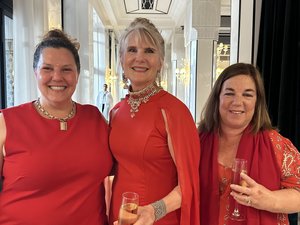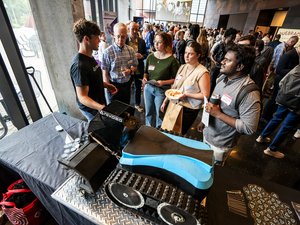
Midwest Pantry founders Zoie Glass and Chad Gillard are betting on Minnesota’s potential as a thriving home for food-related startups and innovation.
Glass and Gillard founded Midwest Pantry in 2009 to help small food businesses grow by building connections between entrepreneurs and offering practical support. Now, they’ve formed the NE Food District – a cluster of workspaces in Minneapolis that they say will foster innovation by offering physical space for food entrepreneurs.
The food district includes kitchens and meeting spaces that bring together companies of varying sizes and stages. The NE Food District started with six kitchens of varying sizes that could be leased by companies needing more access than a shared commercial kitchen space may offer, but are not ready to do a full build-out of their own. To lease the space, companies have to be ready to outfit the kitchen with their own equipment.
The Food Foundry – located a short walk up California Street NE from the kitchens – offers shared office space that caters to firms of varying sizes. Similar to the kitchens, the office space is built to accommodate growing businesses, whether they need a conference room, a regular desk, or a dedicated space to house a marketing department.
A custom-built space for Local Crate – a Twin Cities startup dedicated to filling its meal kits with local products – feels like the last piece of building a solid foundation, showing how this kind of innovation district can work, the founders said. But it’s not the end of their expansion. Their website boasts that the NE Food District includes more than 250,000 square feet, offering plenty of space for more kitchens and production spaces as demand increases.
From the structure of the lease – a fixed cost for three years – to the shared amenities that would be too expensive for a single small food company to spring for, Midwest Pantry is tapping into common challenges businesses face. They have their eyes on smoothing out the growing process, “so a business can take steps, not leaps,” Gillard said.
They’re charting a course they hope others will follow. In the years since they started Midwest Pantry, the founders have noticed innovation happening throughout the state. That innovation accompanies a necessary shift in mindset that recognizes food businesses – like the ones that start as a farmers market stall – could contribute to the economic development folks are looking for in Greater Minnesota.
“A lot of these different organizations didn’t understand that there was a ton of companies that were making products and making a living doing this that wanted to grow to have employees and move forward,” Glass said. But now that’s changing, and people realize “that this is viable – that this could be an economic driver.”








